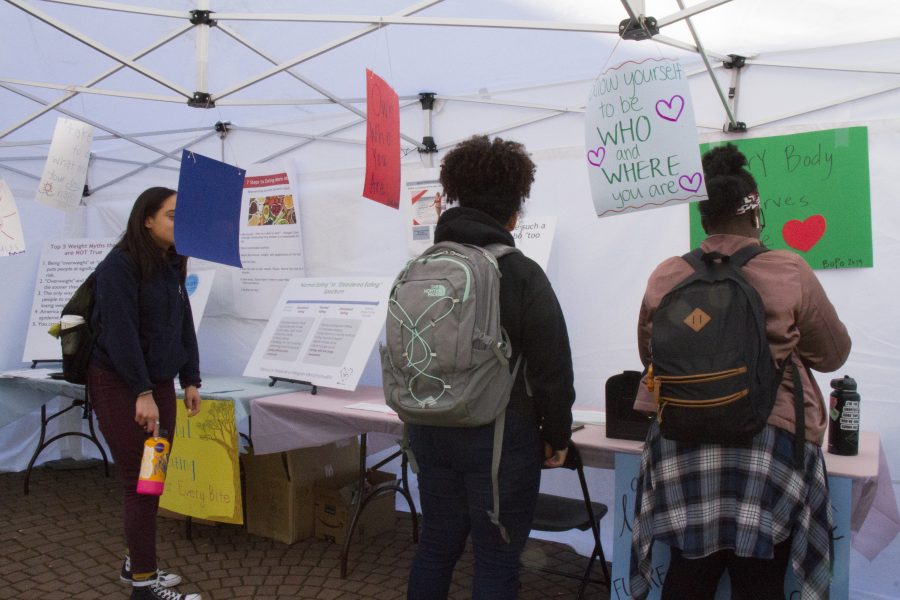Body positive week prioritizes self-love
A large, white tent stands in the middle of Martin Square, surrounded by uplifting chalk art and filled with informational resources. Notes reading, “You’ll always be beautiful” and “Love yourself” are mounted on a paper tree outside of the booth, the number of positive messages growing every day as more sticky notes appear.
From Feb. 25 to 28, the campus celebrated Body Positivity Week.
Although most of the nation celebrates Eating Disorder Awareness Week, staff and students decided that a wider focus was needed to bring attention to issues surrounding body positivity. As a topic of growing importance in today’s society, it has become increasingly important that young people broaden their perspectives on body positivity.
“We are taking it a little bit broader and making it all about wellness, body positivity and self care. So that is our take on it,” said Mya Kwon, the counseling center dietician.
In 2016, a pair of students in one of Kwon’s nutrition classes attended a training sponsored by an organization called The Body Positive. The students, as well as Kwon, went through a workshop where they were trained on how to facilitate conversations about body positivity.
“After they went through that, they were like, ‘Ok we want to do something about this and we want to start something at SPU,’” Kwon said.
Now in its fourth year, Body Positivity Week is still student driven. Every year, a small group of students form a committee to plan events for Body Positivity Week.
Kwon, as well as a graduate intern, help the students gather resources and put their plans into action. Hannah Baillie, a senior studying dietetics, was one of the volunteers this year.
“You can never have too much positivity in the world and I feel like what we are doing is spreading that,” Baillie said. “Giving someone a flower or information or a button can just brighten their day or even inform them of something and they can spread that around.”

Body Positivity Week provided resources on everything from false weight myths to the spectrum between normal eating and disordered eating. The week ended in a screening of the film “Embrace,” a documentary that follows a body positivity activist as she explores the topic of self loathing.
In a society that is filled with images of ideal beauty standards and photoshopped models, body positivity is a topic affects many people. Baillie acknowledges that the media often only portrays one idea of beauty, even though there are many ways to be beautiful. This coded messaging from society has created complicated feelings for a lot of people.
“I feel like everyone struggles with feeling insecure about themselves. Maybe not always on a large scale, like to an eating disorder level, but even on a small scale we kind of all feel that,” Baillie said.
Junior Tatiana Quezada, a student who browsed the booth on the first day of Body Positivity Week, admitted that she sometimes doesn’t love herself in the way that she should. Quezada, however, believes that it is important to take care of your body because it is the only one that you have, and that care can help you extend care to others.
“If you don’t accept yourself, then how can you go on and give your love to everyone else?” Quezada said.
Body positivity is closely tied to both mental and physical health. According to the Eating Recovery Center, eating disorders have the highest mortality rate of any mental illness.
Education on these topics is important, as over 70 percent of those suffering from eating disorders will not seek treatment due to stigma and misperceptions. Most of these disorders begin between the ages of 18 and 25, the age of most college students.
With media influences and societal pressures hanging over the head of the next generation, Quezada says that taking time to think about oneself can help young people keep going.
“Once we accept ourselves, we can give ourselves strength to go,” Quezada said.















































































